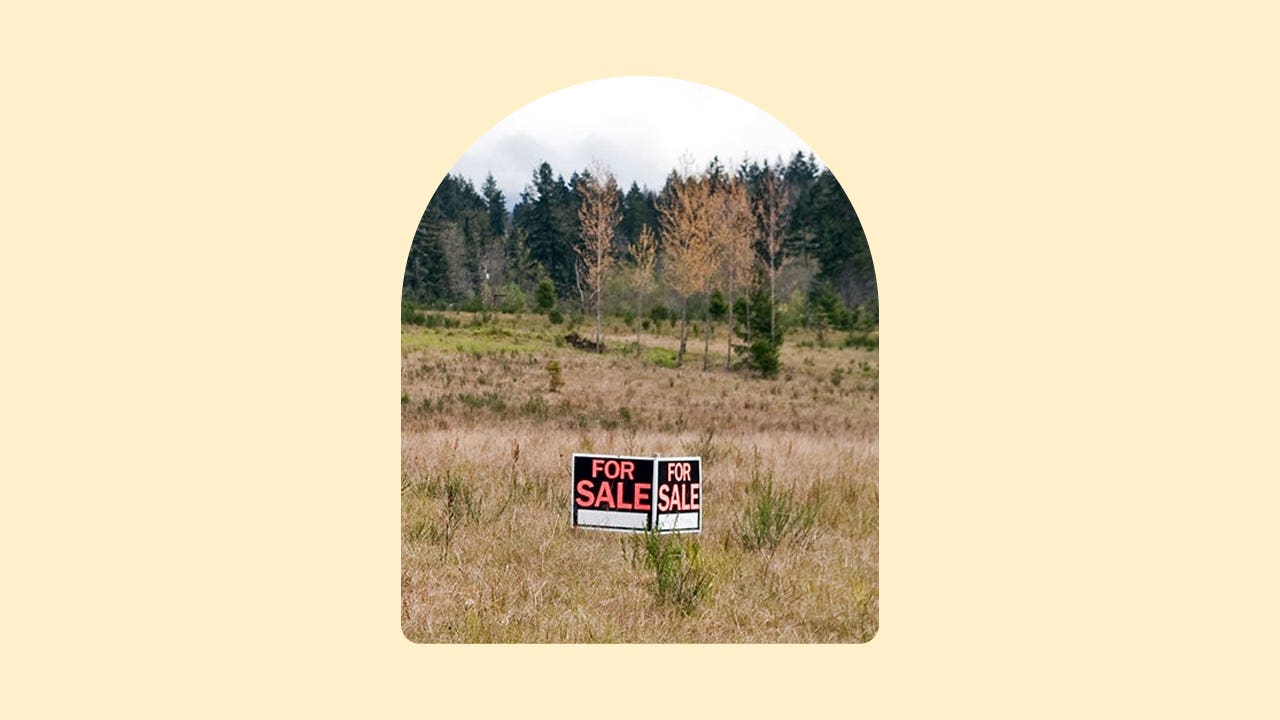How to buy land: A step-by-step guide

Key takeaways
- The loan options for purchasing land differ from a home purchase mortgage and are usually more expensive.
- Land plots for sale can be difficult to find. Some real estate agents are Accredited Land Consultants who specialize in the subject.
- Before making an offer, research the property thoroughly and make sure it meets your needs regarding zoning, utilities and road access.
Buying a parcel of land can be very different than buying a home. It can also be a bit more challenging: Financing the purchase might be tricky, and while new home listings hit the market every day, vacant land lots can be tougher to find. Whether you’re contemplating building a house for your family or using it for another purpose, read on to get a sense of the process of buying land.
1. Create a usage plan for lenders
If you can afford to make the purchase in cash — meaning without the need for any financing — then you won’t have to explain to a lender how you intend to use the land, and what timeline its development will follow.
However, if you intend to finance the purchase, you should have a usage plan in place — and be prepared to contribute a sizable chunk of money upfront. Lenders will be looking for both, says Dallas Waldon, co-founder and managing partner of real estate investing firm Land Boss.
“For raw land purchases, traditional banks can be pretty demanding, typically requiring 50 percent down, strong credit and development plans,” Waldon says. “Without immediate building plans, securing a land loan becomes much more challenging, particularly for larger parcels over 20 acres. Even with a substantial down payment, lenders often hesitate when there’s no clear timeline for development.”
2. Understand your loan options
Your loan options and terms might differ depending on what type of land you’re looking to buy. There are three main categories:
- Raw land is entirely untouched, lacking roads, power or sewage systems. Because of the inherent risks associated with such properties, raw-land loans often require a significant down payment and carry higher interest rates.
- Unimproved land might have some basic amenities but is missing crucial utilities like electric and gas meters. It’s not as risky to lenders as raw land, but they may still demand larger down payments and have higher interest rates.
- Improved land is already partially developed, with access to roads, electricity and water. Loans for this type of land might have more favorable interest rates and lower minimum down payment requirements in comparison to raw or unimproved land.
Your financing options for buying land might include the following:
- Bank or credit union land loan: A local bank or credit union is more likely to be familiar with the land in the area, and could offer a loan with better terms. You might also try seeking out a consumer-owned credit cooperative, some of which specialize in rural or agricultural lending.
- USDA loan: If the land is in an eligible rural area and you plan to build your primary residence on it, you might qualify for a USDA loan from the U.S. Department of Agriculture. These loans typically have affordable interest rates and down payment requirements. Options include Section 523 loans for those who plan to build the home themselves and Section 524 loans for those who will hire a contractor.
- SBA 504 loan: The Small Business Administration (SBA) partners with financial institutions to provide financing for business owners who purchase land for business use in the form of an SBA 504 loan. You could qualify for this kind of loan with a 10 percent down payment (among other criteria).
- Home equity loan: If you already own a home, you could consider tapping your existing equity with a home equity loan. This approach might be less expensive than a land loan — but always proceed carefully when using your house as collateral.
- Owner financing: Waldon recommends exploring the possibility of owner financing — an agreement in which the seller essentially acts as the lender. “If possible, owner financing is usually much more flexible,” she says. “We see a typical owner requiring around 20 percent down, with favorable terms and low-to-no credit requirements.” With this option it’s best to hire an attorney to assist with negotiating the terms of the deal.
You might also consider a construction-to-permanent loan. “If you’re thinking about planting a modular or manufactured home on the property, many builders have established relationships with lenders who understand their projects and trust them,” Waldon says. “Instead of seeking separate loans for the land and the home, you can wrap them into one loan and just one payment per month.”
3. Consider every expense
Depending on how you plan to use the property, buying land can come with many additional costs, such as permit fees or the expense of building a septic system. There are also the usual costs for maintenance and upkeep.
And don’t forget closing costs, which can vary dramatically. “Consider making closing costs part of your initial negotiation with the seller,” Waldon says. “Many are willing to cover these expenses to secure a solid buyer or agree to paying a specified amount. Don’t be shy about requesting an estimated statement from title companies or real estate attorneys before you begin, either.”
4. Find appropriate land for sale
Consult with a real estate agent who specializes in land sales or a land planner, whose job is to evaluate whether it’s feasible to build or develop a piece of land. A land planner evaluates the slope of the land, the water table, type of soil and vegetation and other factors to determine what structures the land can sustain.
Depending on where you live, there could be a real estate agent (or several) in the area who specialize in local land sales. Look particularly for agents who have earned the Accredited Land Consultant (ALC) designation. Their specialized skills and knowledge enable them to identify and compare vacant land plots that cater to a buyer’s specific needs. By understanding the property type, location and zoning regulations, ACL agents can guide buyers toward the perfect piece of land for their desired use.
While an agent may already have a full list of available lots, you can also look for listings online; sites to try include LandSearch.com, Land.com, LandandFarm.com and LandHub.com. In addition, consider these approaches:
- Browse your local paper: The classifieds section in your local newspaper could advertise listings from landowners selling parcels independently, and you might be able to save money by connecting with the owner directly.
- Take a drive: Another way to find land for sale is to simply drive around your desired area and look for for-sale signs. You might be able to uncover land that isn’t listed online this way.
-
Look for government land listings: Sometimes the government offers land up for grabs, such as repossessed parcels. Try searching for what’s available on Disposal.gsa.gov or RealEstateSales.gov, both official websites of the U.S. General Services Administration. Land sold by the government usually gets offloaded through an auction, so if this is your strategy, be prepared to go through the auction bidding process.
5. Research the property
When you find the right plot of land to purchase, do your homework before making an offer. Here are some key issues to investigate:
- Utilities: Are there hook-ups for water, sewer and electricity on the property? If not, you’ll need to install them, which can be expensive.
- Road access: Is there access to the property from a public road? If not, you may need to get an easement to build a road.
- Zoning and land-use restrictions: Is your idyllic country property actually zoned for industrial, agricultural or retail use instead of residential? Will a road or shopping center be built near the property someday? Check your local zoning authority’s website or visit the town hall in person to learn about regulations in the area, and any construction plans that could impact your parcel.
- Property taxes: Look into the rate of property taxes on the parcel and make sure they’re not so high as to make the purchase economically unfeasible.
- Property survey: Be sure you know exactly where the property boundaries are, so that you know where you can build and where you can’t, or the precise perimeter for fencing. A property survey will also alert you if a neighbor has encroached on the property.
6. Make an offer
Once you’ve researched the property and know how you plan to finance the purchase, you’re ready to make an offer. This written document contains the details of the property, your contact information, the price you’re willing to pay and other terms.
You’ll also want to include contingencies in your offer to protect yourself from factors that might make you want to walk away from the deal. Common contingencies with land purchases include environmental tests, septic system permits, land surveys and zoning regulations. Templates of sample purchase agreements are available online, but unless you’re an experienced buyer, you’ll probably want to get a real estate lawyer or licensed agent to prepare the offer for you.
Bottom line
Buying land can be trickier and more costly than buying a home, and there are different requirements for getting a land loan compared to a home purchase mortgage. And don’t forget that if you intend to build a house on your land, you’ll also need to factor in construction costs.
Why we ask for feedback Your feedback helps us improve our content and services. It takes less than a minute to complete.
Your responses are anonymous and will only be used for improving our website.
You may also like





